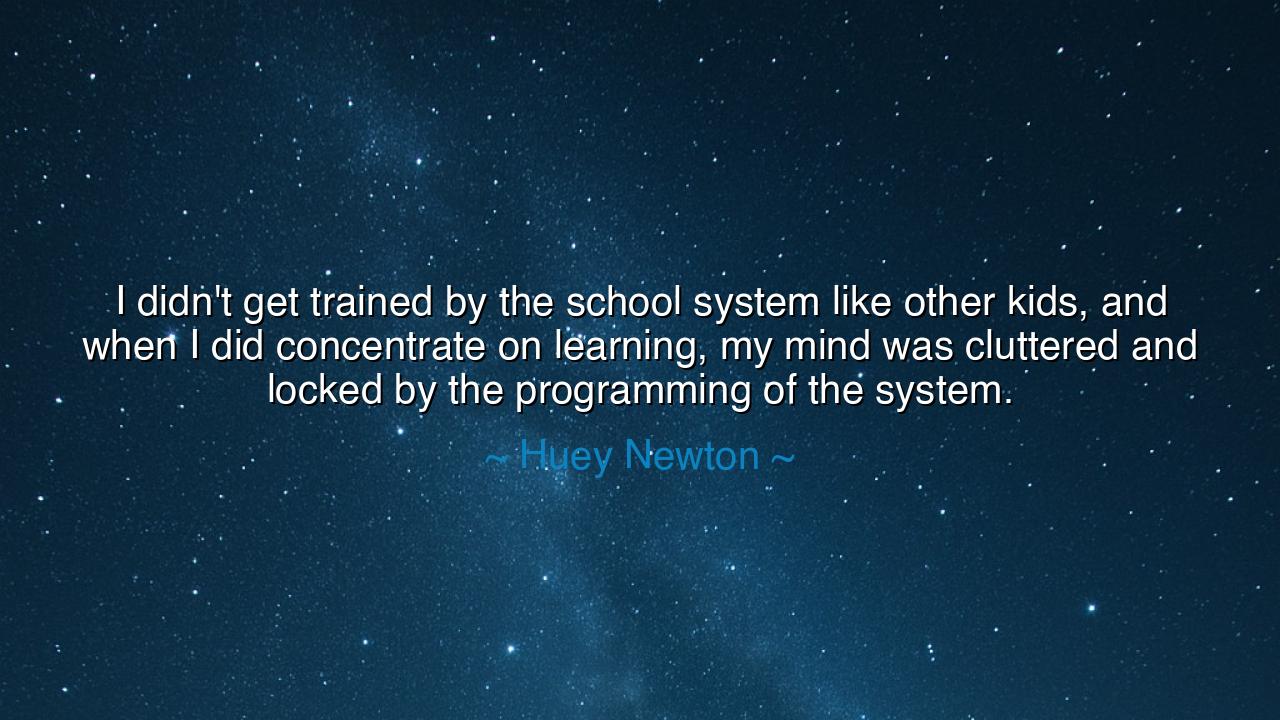
I didn't get trained by the school system like other kids, and
I didn't get trained by the school system like other kids, and when I did concentrate on learning, my mind was cluttered and locked by the programming of the system.






When Huey Newton said, “I didn’t get trained by the school system like other kids, and when I did concentrate on learning, my mind was cluttered and locked by the programming of the system,” he was not rejecting knowledge — he was reclaiming the meaning of it. His words rise from the depths of rebellion and revelation, for he understood that education, when bound by conformity, can become a kind of mental imprisonment. Newton, co-founder of the Black Panther Party, was a man who sought truth not in textbooks but in lived experience. His statement is not just a critique of schooling; it is a call for liberation — a reminder that true learning begins only when the chains of indoctrination are broken.
The origin of this thought lies in Newton’s own life, one marked by both struggle and awakening. Born into poverty in the racially segregated South, he grew up witnessing injustice not as theory but as reality. The schools he attended, like many in that era, did not teach him to think freely — they taught him to obey, to accept, to fit into a system designed to silence his people. For a time, he failed by the system’s standards, but later he realized that the failure was not his — it was the system’s. When he finally turned his mind toward self-education, reading the works of Plato, Marx, and Fanon, he saw how deeply his thoughts had been shaped by the limits imposed on him. In this awakening, he recognized that the mind, once programmed for submission, must fight to remember its own freedom.
In the style of the ancients, Newton’s words recall the story of Socrates, who stood before the Athenian assembly and declared that true wisdom was not taught in the schools of rhetoric or law, but born in questioning. The system, Socrates said, trained men to speak well but not to think well. For this defiance, he was condemned — just as Newton would be condemned in his time. Yet both men shared the same truth: that knowledge without freedom is not enlightenment, but enslavement. The schools that teach obedience produce citizens who follow orders; the schools that teach inquiry produce souls who change the world. Newton’s voice, like that of the old philosophers, reminds us that the duty of the learner is not to conform, but to awaken.
The “programming of the system” Newton speaks of is not mere education, but ideology — a subtle shaping of perception that tells the oppressed who they are and where they belong. It is the unseen force that convinces a child to measure worth by approval, to mistake memorization for mastery, to believe the limits set upon them are natural and just. Newton’s realization was an act of spiritual revolution: that before one can fight for liberation in the streets, one must first liberate the mind. He saw that the first battlefield of freedom is thought itself, and that the greatest victory is to reclaim one’s capacity to think independently, without fear or permission.
History echoes his insight through the lives of many who transcended their “training.” Frederick Douglass, born into slavery, was denied formal education — yet through secret study, he taught himself to read and write. When he finally grasped the power of words, he said it was both a blessing and a curse: for with knowledge came the unbearable awareness of his bondage. But Douglass refused to be a prisoner of ignorance or despair. He, like Newton, understood that education without emancipation is hollow, and that the truest learning is that which restores dignity, purpose, and self-determination. Their paths — one from slavery, the other from systemic oppression — converge upon the same truth: the mind must be freed before the body can be.
Newton’s statement also invites us to examine our own time, where the “programming of the system” continues in subtler forms. We are trained to memorize instead of imagine, to compete instead of connect, to seek approval instead of truth. Our schools often shape workers, not thinkers; followers, not visionaries. Yet the ancient call still resounds: Know thyself. To learn deeply is to see beyond what is taught; to understand is to question who benefits from the lesson. Newton’s wisdom, then, is not a rejection of learning, but a demand that we reclaim it — that we make knowledge a tool of liberation, not domination.
The lesson of his words is eternal: do not mistake schooling for education, nor information for wisdom. Learning is sacred only when it serves freedom. Every mind must at some point unlearn what has been imposed upon it — must strip away the falsehoods of hierarchy, prejudice, and fear — before it can know truth. To learn, therefore, is not just to absorb, but to awaken; not just to conform, but to create; not just to repeat, but to question until one’s mind becomes truly one’s own. The wise do not seek to be trained — they seek to be transformed.
So remember this teaching, passed down like a torch from Newton to every soul that seeks freedom: the system can teach you to recite, but only you can teach yourself to see. Let no institution define your worth, no structure dictate your thought. Read widely, question deeply, and think boldly — for every time a mind escapes its programming, humanity moves one step closer to liberation. And in that act of awakening, you too become what Huey Newton became — not merely a student of knowledge, but a free mind in a world that fears freedom most of all.






AAdministratorAdministrator
Welcome, honored guests. Please leave a comment, we will respond soon